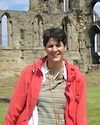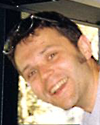 |
dr. sc. Tonija Andrić
University of Split, Faculty of Philosophy
E-mail: tonija@ffst.hr
Publications
Born in 1981 in Split. In 2005, she graduated from the History Department at the University Centre for Croatian Studies, University of Zagreb, where she also defended her PhD dissertation in 2014 more (supervisor: Irena Benyovsky Latin), titled “Život splitskog puka u srednjem vijeku: primjer obrtnika sredinom 15. stoljeća” [Life of Split’s commoners in the Middle Ages: The case of artisans in the mid-15th century]. From 2006-2008, she worked at the National Centre for the External Evaluation of Education, Primary School Department. Since 2008, she has been teaching at the Chair of Ancient and Medieval history, History Department, Faculty of Arts and Social Sciences, University of Split, since 2016 as a docent. Her courses focus on the general and national medieval history, as well as ancillary historical disciplines. Her fields of interest include economic and social history of Dalmatia in the medieval period, particularly the development of Split’s artisans in the period of Venetian rule over Dalmatia. In 2010, Andrić was an OEÄD fellow at the Institute for the History of Eastern Europe, University of Vienna. Member of the editorial board of Ivan Lučić Lucius: Student Journal of the Croatian University Centre (since 2004). close
|
 |
Sandra Begonja
Croatian institute of history
E-mail: sbegonja@isp.hr
Publications
Born in 1978 in Split. In 2000, she completed her studies in Fashion Design at the Faculty of Textile Technology, and in 2008 she graduated History and Art History from the Faculty of Arts and Social Sciences, University of Zagreb. more In 2011, she started a PhD programme of medieval studies at the Faculty of Arts and Social Sciences, University of Zagreb. Currently working on her doctoral dissertation titled Uloga gradskog plemstva u urbanom razvoju Zadra u vrijeme Ludovika I. Anžuvinca (1358.-1382.) [The role of urban nobility in the development of Zadar during the rule of Louis I Anjou (1358-1382)] (supervisors: Irena Benyovsky Latin and Predrag Marković). Since 2011, Begonja has been working at the Croatian Institute of History as a junior researcher on the project of Irena Benyovsky Latin “Towns and Cities of the Croatian Middle Ages: Social Structures, Topography, and Urban Life] (2011-2014). She has participated in various workshops, such as LLL Erasmus (Intensive Programme (IP)): Integrated Systems of Sources, Technologies and Methods – Remote Sensing of Historical Landscape (IntSYSTEM) (Rab, 2014) and RAMS (Conference and School on Records, Archives and Memory Studies) (Zadar, 2013). close
|
 |
dr. sc. Ante Birin
Croatian institute of history
E-mail: ante.birin@gmail.com
Publications (2)
Born in 1973 in Zagreb, where he completed his secondary education. In 1996, he graduated History and Archaeology from the Faculty of Arts and Social Sciences, University of Zagreb. more During his studies, he won several international grants and had the opportunity to participate in Convegni di studio sulla Magna Grecia, with the topic of “Corinto e l'Occidente,” at Taranto (October 7-11, 1994) and a seminar on Etruscology and Italic history titled “Public and Private Life of the Etruscans and other Italic Peoples” at the Universita per stranieri in Perugia (July 3-14, 2000). In 2001, he obtained an MA degree from the Department of History, Faculty of Arts and Social Sciences, University of Zagreb, with a thesis titled “Statut grada Skradina” [Statute of the city of Skradin] (supervisor: Tomislav Raukar). In 2006, he defended his doctoral dissertation “Knez Nelipac i hrvatski velikaški rod Nelipčića” [Count Nelipac and the Croatian noble kindred of Nelipčić] (supervisor: Tomislav Raukar). Since 1998, he has been working as a junior researcher at the Croatian Institute of History, with a permanent position at the Department of Medieval History since 2008. In 2014, he became a senior researcher, and in 2012 a docent. Since 2007, he has been teaching at the University Centre for Croatian Studies, University of Zagreb, with a course on Croatian Cultural and Political History of the Middle Ages. Since 2009, he has been a member of the editorial board of Povijesni prilozi. In 2002, he was awarded the Silver Distinction of Matica Hrvatska for his book Statut grada Skradina [Statute of the City of Skradin]. He has organized various scholarly conferences. close
|
 |
dr. sc. Danijela Doblanović
Juraj Dobrila University of Pula, Department of Humanities
E-mail: danijela.doblanovic@gmail.com
Publications
Born in 1981 in Pula, where she completed her secondary education. In 2004, she graduated Croatian Philology and History from the Faculty of Arts and Social Sciences, University of Pula. more In November 2013, she defended her doctoral dissertation at the University of Zagreb, titled “Demografska slika župe Svetvinčenat od početka 17. do početka 19. stoljeća” [Demography of the Svetvinčenat parish from the early 17th until the early 19th century] (supervisor: Nenad Vekarić). Since 2009, she has been working as an assistant at the Department of History, Juraj Dobrila University in Pula. Her research interests include the early modern period in Istria, especially historical demography. She is a member of the editorial board of Histria (journal of the Istrian Historical Society). close
|
 |
d.i.a. Ivana Haničar Buljan
Institute of Art History
E-mail: ihanicar@ipu.hr
Publications
Born in 1970 in Osijek. In 1996, she graduated from the Faculty of Architecture, University of Zagreb. Currently enrolled in a doctoral programme of Architectural Heritage, preparing her dissertation on the opus of architect Stjepan Planić. more Since 1996, she has been working at the Institute of Art History in Zagreb as an associated researcher in the field of architecture. Since 2011, she has been an assistant to the Head of the Institute of Art History. Participated in various field projects of architectural documentation of historical buildings, held under the auspice of the Institute. As an associated researcher, she has coproduced various conservationist evaluations. Since 2014, she has participated in the following projects: “Research and Documentation of the Urban Core of Osijek’s Fort for the Needs of Urban-Conservationist Evaluation”; “Urban-Conservationist Evaluation of the Ground Floors of Public Spaces in Osijek’s Fort, with a Proposal of Conservation Guidelines” (since 2014); Castle of Eugene of Savoy in Bilje (2013-2014); the Great Bridge in Osijek (2012-2013). She has co-authored two books (with Ratko Vučetić): Nuštar: Dvorac Khuen-Belassy, arhitektonska, povijesno – umjetnička, restauratorska istraživanja [Nuštar – The Khuen-Belassy castle: Research in architecture, art history, and restoration] and Darda: Dvorac Esterhazy, Povijesno-građevinski razvoj, valorizacija i prijedlog konzervatorskih smjernica [Carda – Eszterhazy castle: Historical-architectural evolution, evaluation, and proposal for conservation guidelines]. Since 2002, she has coordinated the Architectural Heritage section at the Architects’ Association Zagreb. Since 2008, she is a member of the editorial board of Kvartal and in 2008 she was the guest editor of Život umjetnosti (82/2008). Since 2002, she has been licensed by the Croatian Ministry of Culture for working on the protection and conservation of cultural goods (research and documentation, as well as production of concepts, main and construction projects for immovable heritage). Member of the Architects’ Association Zagreb. close
|
 |
dr. sc. Marija Karbić
Croatian institute of history
E-mail: mkarbic@isp.hr
Publications
Born in 1961 in Zagreb. In 1996, she graduated History from the Faculty of Arts and Social Sciences, University of Zagreb, where she obtained her MA degree in 2001 with a thesis titled “Obitelj u gradskim naseljima srednjovjekovne Slavonije” [Family in the urban settlements of medieval Slavonia] and her PhD in 2005, more with a dissertation titled “Rod Borića bana. Primjer plemićkog roda u srednjovjekovnoj Požeškoj županiji” [The kindred of Borić-ban: A noble kindred in medieval Požeška County]. Since 1997, she has been working at the Croatian Institute of History (Department for the History of Slavonia, Srijem, and Baranja), since 2007 as a senior researcher. She has been a guest lecturer at the University Centre for Croatian Studies and the Faculty of Arts and Social Sciences, University of Zagreb. Participated in various projects: “Slavonia, Srijem, and Baranja from Late Antiquity to the Ottoman Times” (2007-2013); “Croatian Noble Kindreds: Their Estates, and Fortified Towns (2002-2006); Sources, Studies, and Aids for Croatian History from the 7th to 19th Centuries” (1995-2006); “Comparing Nobilities in Medieval Europe: Centar and Peripheries in the process of Europeanization (1000-1500),” project coordinator: Cosmin Popa-Gorjanu, University of Alba Iulia, Romania (since 2009); “Women in Croatia: Cultural History,” project coordinator: Andrea Feldman, Women’s Info Centre – Vlado Gotovac Institute (2000- 2002); “Nobility in Medieval and Early Modern Central Europe: A Comparative Study in Social Structure,” project coordinator: János M. Bak, Central European University, Budapest (1996-1999). Her research interests include the history of nobility and urban settlements in the interfluvial region between the Sava and Drava rivers in the Middle Ages, and especially family history and gender history. Author of the book Plemićki rod Borića bana [The noble kindred of Borić-ban] (Slavonski Brod: Department for the History of Slavonia, Srijem, and Baranja, 2013) and co-author (with Damir Karbić) of The Laws and Customs of Medieval Croatia and Slavonia: A Guide to the Extant Sources (ed. Martyn Rady) (London: UCL School of Slavonic and East European Studies, 2013). close
|
 |
dr. sc. Ivana Lazarević
Institute for Historical Studies of the Croatian Academy of Sciences and Arts in Dubrovnik
E-mail: ivana.lazarevic@du.t-com.hr
Publications
Born in 1973 in Dubrovnik. In 1999, she graduated Art History and General Phonetics from the Faculty of Arts and Social Sciences, University of Zagreb. In 2012, she obtained her PhD degree in Demographic History from the University of Zagreb, more with a dissertation titled “Vlasteoske kuće u gradu Dubrovniku 1817. godine” [Noble Houses in the City of Dubrovnik in 1817]. From 1999-2011, she worked at the State Archive in Dubrovnik. In 2002, she passed the professional exam for an archivist, and in 2006 became a specialist in Archival Studies. During the academic year 2002/2003, she taught a course on Fine Arts: Visual Arts at the American College of Management and Technology, and in 2004 she lectured on various subject at the Course for Archival Employees. She also holds courses in the BA programme on the History of the Adriatic and the Mediterranean in Dubrovnik. Since 2011, she has worked as an assistant at the Institute of Historical Research, Croatian Academy of Sciences and Arts (HAZU) in Dubrovnik. In 2013, she obtained the status of expert associate. Member of the Croatian Archivists’ Association (presidency member from 2005-2010), Matica Hrvatska (presidency member from 2007-2012), the Croatian Anthropology Society, and the Croatian National Committee for Historical Research. Member of the editorial board of Anali Zavoda za povijesne znanosti HAZU u Dubrovniku and Dubrovnik Annals. Since 2014, she has participated in the COLINDA project (HRZZ). Author of the monograph Vlasteoske kuće u gradu Dubrovniku 1817. godine [Noble Houses in the City of Dubrovnik in 1817] (2014). close
|
 |
dr. sc. Dušan Mlacović
University of Ljubljana, Faculty of Humanities and Social Sciences
E-mail: dusan.mlacovic@ff.uni-lj.si
Publications
Born in 1966 in Celje (Slovenia). In 1992, he graduated History and Philosophy from the Faculty of Arts and Social Sciences, University of Ljubljana. From 1993-1999, he was a junior researcher at the History Department, Faculty of Arts and Social Sciences, University of Ljubljana. more In 1997, he obtained his MA degree and in 2006 his doctoral degree from the same university. From 2003-2005, he worked at the Research Centre Bistra Ptuj as an independent researcher and project coordinator, and since 2007, he has been a docent at the Faculty of Arts and Social Sciences, University of Ljubljana (History Department), with courses on medieval history (History of South-eastern Europe in the Middle Ages and General Medieval History). He has participated in the following projects: “Inscription of Intangible Cultural Heritage of Ptuj” in the UNESCO programme “Masterpieces of the Oral and Intangible Heritage of Humanity” (2006-2008); “ADHOC” (Interreg III B Cadses) as the project coordinator and head of a working group of ADHOC’s project partner (2006-2008); “Sm@rt Region” (Interreg III B Cadses) as the project coordinator of the leading project partner (SRC Bistra Ptuj) (2004-2005); “Positioning the Urban Elite in Slovenian Towns in the Context of Social and Economic Trends and Processes (13th-16th Centuries)” (2008-2010); and “Political and Legal History of Women in Slovenia: Man and Nature in Pre-Modern Slovenia (ARSS) (2009-2011). In 2008, he published the monograph Plemstvo i otok: pad i uspon rapskoga plemstva [Nobility and the Island: The fall and rise of Rab’s nobility] (Slovenian ed. 2008; Italian ed. 2012). Assistant to the editor-in-chief of Zgodovinski časopis – Historical Review (since 2007) and a member of the editorial board of Povijesni prilozi (since 2012). close
|
 |
dr. sc. Marija Mogorović Crljenko
Juraj Dobrila University of Pula, Department for Humanities
E-mail: mmogorov@unipu.hr
Publications
Born in 1975 in Zagreb. Completed her secondary education in Rovinj. In 1999, she graduated History and Croatian Philology from the Faculty of Arts and Social Sciences, University of Pula. She obtained her MA degree in 2005 and her PhD degree in 2010 from the Faculty of Arts and Social Sciences (History Department), University of Zagreb. more In 1995, 1996, 1997, and 1998 she participated in the Medievalist Workshop in Dubrovnik. She taught history at the Rivarela primary school in Novigrad, and Croatian language and history at the Pazin Collegium (Classical Grammar School). From 1998-2000, she worked at the History Museum of Istria. Since 2000, she has been employed at the History Department of the Former Faculty of Arts and Social Sciences in Pula, today’s Humanities Department at the Juraj Dobrila University in Pula. In 2011, she became a private docent, and in 2013 a docent, with various courses on medieval and early modern history, as well as ancillary historical disciplines. Her research interests include everyday life and the society, especially the position of women, as well as marriage and family in Istria during the medieval and early modern periods. She is one of the initiators and organizers of the international symposium Istrian Historical Biennial (2003, 2005, 2007, 2009, 2011, 2013), which focuses on the history of everyday life in the Adriatic region. As a member of the organizational board, she has participated in the organization of the 2nd Congress of Croatian Historians in Pula (2004) and the 15th Annual Mediterranean Studies Congress in Pula (2012). She has taken part in the following projects: “Medieval Istria: An Area of Community and Opposition (6th-16th Centuries)” (2010-2012); “Elite and Marginal Groups in Istria (16th-18th Centuries)” (2007-2010); “Eastern Istria and Northern Liburnia in Antiquity” (2000-2006); “Across the Religious Divide: Women`s Properties in the Wider Mediterranean (ca. 1300-1800)” (project coordinators: Jutta Gisela Sperling and Shona Kelly Wray) (2008-2010). She has published two books: Nepoznati svijet istarskih žena [The unknown life of Istrian women] (Zagreb: Srednja Europa, 2006) and Druga strana braka [The other side of marriage] (Zagreb: Srednja Europa, 2012). She has been editing the Proceedings of the Istrian History Biennial as a member of the editorial board or the editor-in-chief. She has participated in a number of Croatian and international scholarly conferences. Publishes in various Croatian and international journals and conference proceedings. close
|
 |
dr. sc. Zrinka Nikolić Jakus
University of Zagreb, Faculty of Humanities and Social Sciences
E-mail: zrinknik@gmail.com
Publications
Born in 1973 in Zagreb. In 1996, she graduated from the Faculty of Arts and Social Sciences, University of Zagreb. In 1997, she obtained her MA degree and in 2004 her PhD degree from the Department of Medieval Studies, Central European University in Budapest. more In 1993, 1994, and 1997 she participated in the Medievalist Workshop in Dubrovnik. In 2004, she received the award of the Association of University Teachers and Researchers in Zagreb for young scholars and artists for a scholarly article published in 2003/2004. Since 1988, she has been working as an associate professor at the History Department, Faculty of Arts and Social Sciences, University of Zagreb, with courses on medieval history. She has participated in the following research projects: “Monumenta mediaevalia varia” (2007-2013); “Croatia and Central Europe in the Middle Ages” (2002-2005); Fundamental Documents of Croatian History (1998-2002); “Comparing Nobilities in Medieval Europe: Centar and Peripheries in the Process of Europeanization (1000-1500),” project coordinator: Cosmin Popa-Gorjanu, University of Alba Iulia, Romania (since 2009); “Women in Croatia: Cultural History,” project coordinator: Andrea Feldman, Women’s Info Centre – Vlado Gotovac Institute (2000-2002); “Nobility in Medieval and Early Modern Central Europe: A Comparative Study in Social Structure” (project coordinator: János M. Bak), Central European University, Budapest (1997-1999). Member of the editorial boards of Povijesni prilozi (since 2009) and Publications Zavoda za Hrvatsku povijest (since 2010). Organizer of the international conference “Hagiography: Historiography, Sources, and Methods” (Dubrovnik, 2005). Publishes extensively in Croatian and international journals and conference proceedings. Author of the monograph Rođaci i bližnji. Dalmatinsko gradsko plemstvo u ranom srednjem vijeku [Kin and kindred: Dalmatian urban nobility in the early medieval period] and handbook Uvod u studij povijesti. Historiografski praktikum [Introduction to historical studies: A historiographical practicum]. Editor of the first volume, dedicated to the early Middle Ages (550-1150) in the series Povijest Hrvata [History of the Croats] published by Matica Hrvatska. Her research interests include the history of elites, family history, women and children, as well as everyday life in the Middle Ages. close
|
 |
dr. sc. Zrinka Pešorda Vardić, project secretary
Croatian institute of history
E-mail: zrinka.pesorda@zg.t-com.hr
Publications
Born in 1974 in Stuttgart. In 1997, she graduated History from the Faculty of Arts and Social Sciences, University of Zagreb. In 2002, she obtained her MA degree and in 2006 her PhD degree from the same university. more In 1994, 1995, 1996, 1997, and 1998, she took part in the Medievalist Workshop in Dubrovnik. Since 1998, she has been working as a senior researcher at the Croatian Institute of History. Since 2009, she has been the coordinator and a member of the editorial board of Povijesni prilozi, and since 2005 a member of the editorial board of Review of Croatian History, published by the Croatian Institute of History. Member of several scholarly associations (Croatian National Committee of Historical Research, Hagiotheca, Matica Hrvatska – History Department). From 2010-2012, she was the vice-president of the Croatian National Committee of Historical Research. She has participated in a number of research projects, including “Settlements and Socio-Political Communities in Medieval Croatia” (2002-2006); “Cities and Towns of the Croatian Middle Ages: Social Structure, Topography, and Urban Life” (2007-2013); and COLINDA (HRZZ) (since 2014). Her main research interests include social and religious history of medieval Dubrovnik, the relationship between the Dubrovnik Republic and the Kingdom of Hungary, and recently also late medieval citizenry. In 2012, she received the State Award for Scholarly Research in the Humanities for her book U predvorju vlasti: Dubrovački antunini u kasnom srednjem vijeku [On the threshold of power: The Antunini of Dubrovnik in the late Middle Ages], published by the Croatian Institute of History and Croatian Academy of Sciences and Arts. close
|
 |
dr. sc. Gordan Ravančić
Croatian institute of history
E-mail: gordan@isp.hr
Publications
Born in 1972 in Zagreb, where he completed his secondary education. In 1996, he graduated History from the Faculty of Arts and Social Sciences, University of Zagreb. In 1997, he obtained his MA degree from the Department of Medieval Studies, Central European University in Budapest. more In 1999, he obtained another MA degree from the History Department, Faculty of Arts and Social Sciences, University of Zagreb, with a thesis titled Život u krčmama u kasnosrednjovjekovnom Dubrovniku [Life in the taverns of late medieval Dubrovnik] and in 2006 he defended his doctoral dissertation titled Kuga u Dubrovniku 1348-1349 [Plague in Dubrovnik, 1348-1349]. He took part in the Medievalist Workshop in Dubrovnik in 1993, 1994, 1995, 1997, and 1998. Since 1998, he has been working as a senior researcher at the Croatian Institute of History, Department of Medieval History. Since 2011, he has been an assistant to the Head of the Croatian Institute of History. He has participated in a number of research project related to the institute, including “Cities and Towns of the Croatian Middle Ages: Social Structure, Topography, and Urban Life” (2007-2013) and “Settlements and Socio-Political Communities in Medieval Croatia” (2002-2006). Presidency member of the Croatian National Committee for Historical Research since 2010 and of the Executional Board of the Society for Croatian Economic and Ecological History. He has organized several scholarly conferences and round tables, such as the Congress of Croatian Historians in Zagreb (2012). From 1998-2013, he lectured at the University Centre of Croatian Studies, University of Zagreb, with courses on Croatian medieval history and the use of computers in historical research. Since 2011, he has been teaching the latter course at the Croatian Catholic University. He has participated in a number of Croatian and international scholarly conferences on the topic of social history and Croatian Middle Ages. Author of several primary- and secondary-school textbooks, as well as two monographs on medieval Dubrovnik: Vrijeme umiranja – Crna smrt u Dubrovniku 1348-1349 [The time for dying: Black Death in Dubrovnik, 1348-1349] (2010) and Život u krčmama u srednjovjekovnom Dubrovniku [Life in the taverns of medieval Dubrovnik] (Zagreb: Croatian Institute of History, 2001). close
|
 |
dr. sc. Anton Ravnikar
University of Maribor, Faculty of Humanities and Social Sciences
E-mail: toneravnikar2712@gmail.com
Publications
Born in 1958 in Ljubljana. In 1982, he graduated History and Sociology from the Faculty of Arts and Social Sciences, University of Ljubljana. more In 2005, he obtained his PhD degree from the University of Maribor. From 1985-2007, he worked at the Museum of Velenje as a curator for cultural history. Since 2007, he has lectured as a docent at the History Department, Faculty of Arts and Social Sciences, University of Maribor, with courses on the medieval history of Europe and the Slovenian lands. He has participated in various research projects, including “The Past of North-eastern Slovenia and the neighbouring countries of Austria, Hungary, and Croatia” (since 2009), financed by the Slovenian Research Agency). Author of seminal studies on urban settlements and urban elites in Styria: Zgodovina Šoštanja [History of Šoštanje] (2011) and Po zvezdnih poteh: Savinjska in Šaleška dolina v visokem srednjem veku [Along the starry paths: The Savinjska and Šaleška valleys during the high Middle Ages] (2007). Member of the editorial boards of Časopis za zgodovino in narodopisje (since 2010) and Studia historica Sloveniae (since 2010). close
|
 |
dr. sc. Bruno Škreblin
Croatian institute of history
E-mail: bskreb@gmail.com
Publications
Born in 1981 in Zagreb. In 2006, he graduated History from the University Centre of Croatian Studies, University of Zagreb. In 2016, he obtained his PhD degree from the same university, with a dissertation titled “Urbana elita zagrebačkog Gradeca od sredine 14. do početka 16. stoljeća” more [The urban elite of Zagreb’s Gradec from the mid-14th to the early 16th century] (supervisor: Irena Benyovsky Latin). Since 2007, he has been working at Matica Hrvatska. Since 2009, he has been a junior researcher at the Croatian Institute of History, Department of Medieval History, since 2016 as an associated researcher. He has participated in the research project of the Croatian Institute of History “Cities and Towns of the Croatian Middle Ages: Social Structure, Topography, and Urban Life” (2009-2013), project coordinator: Irena Benyovsky Latin. His research interests are related to the medieval city and include the urban elites, social topography, and social structures, on which topic he has published a number of studies. close
|
 |
dr. Ratko Vučetić
Institute of Art History
E-mail: rvucetic@ipu.hr
Publications
Born in 1965 in Zagreb. In 1996, he graduated Art History and Ethnology from the Faculty of Arts and Social Sciences, University of Zagreb, with a thesis titled “Prilog urbanističkom razvoju Krapine” [On the urban development of Krapina]. more In 2002, he obtained his MA degree from the same university with a thesis titled “Prostorna struktura srednjovjekovnih gradskih naselja u Hrvatskom zagorju i njihov razvoj do Prvog svjetskog rata” [Spacial structure of medieval urban settlements in Hrvatsko Zagorje and their evolution before World War I] (supervisor: Ivo Maroević) and in 2005, he defended his doctoral dissertation titled “Prostorni razvoj privilegiranih srednjovjekovnih gradova u sjeverozapadnoj Hrvatskoj do 18. stoljeća” [Spacial development of privileged medieval towns in north-western Croatia before the 18th century]. Since 1997, he has been working at the Institute of Art History in Zagreb as a senior researcher. He has been participating in various projects of the institute, including “The Artistic Topography of Croatia” and “Architectural Heritage, 16th-19th Centuries” (project coordinator: Katarina Horvat-Levaj), as well as the international project “A Museum without borders: Baroque Art” (an expertise of the external defence ring of Osijek’s Fort) (2011/2012); “A Study on the Historical Development of the Bastion of Križevci’s Fort” (2011); “A Conservationist Study of the Esterházy Castle in Darda” (2011); and “A Conservationist Study of the Khuen-Belassy Castle in Nuštar” (2010/2011). His research interests include architectural heritage, special organization, evolution of urban settlements, and architecture in continental Croatia. Member of the editorial board of Kvartal. close
|
| |
|















